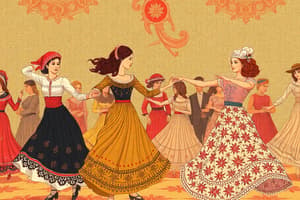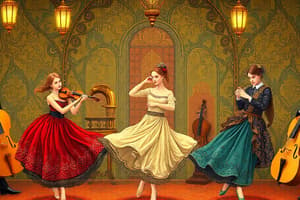Podcast
Questions and Answers
What dance style is characterized by spontaneous movements performed in response to a choreographer's suggestions?
What dance style is characterized by spontaneous movements performed in response to a choreographer's suggestions?
- Improvisation (correct)
- Ritual dance
- Modern dance
- Folk dance
According to James K. Feibleman, what does dance primarily deal with?
According to James K. Feibleman, what does dance primarily deal with?
- Choreography and performance
- The motion of the body (correct)
- Cultural expression
- Music and rhythm
Which of the following dances focuses on depicting ritual ceremonies?
Which of the following dances focuses on depicting ritual ceremonies?
- Ritual dances (correct)
- Occupational dances
- Life-cycle dances
- War dances
What characteristic describes the intent and style of choreography in modern dance?
What characteristic describes the intent and style of choreography in modern dance?
What type of dance is defined as a vernacular expression of past or present culture?
What type of dance is defined as a vernacular expression of past or present culture?
Which of the following best describes life-cycle dances?
Which of the following best describes life-cycle dances?
In what year did Horwitz in Reynolds refer to modern dance as a rebellion against ballet?
In what year did Horwitz in Reynolds refer to modern dance as a rebellion against ballet?
What is the primary purpose of warm-up exercises in dance?
What is the primary purpose of warm-up exercises in dance?
Flashcards
Modern Dance
Modern Dance
A style of dance, also known as contemporary dance, that's not limited to specific themes or styles.
Choreography
Choreography
The art of creating and arranging dance movements.
Plié
Plié
A dance movement involving bending the knees.
Folk Dance
Folk Dance
Signup and view all the flashcards
Ethnic Dance
Ethnic Dance
Signup and view all the flashcards
Warm Up Exercises
Warm Up Exercises
Signup and view all the flashcards
Barre Exercise
Barre Exercise
Signup and view all the flashcards
Improvisation in Dance
Improvisation in Dance
Signup and view all the flashcards
Study Notes
Dance Types and Characteristics
- Improvisation: Spontaneous movements performed by dancers in response to choreographer's suggestions.
- Modern Dance (Contemporary Dance): A dance style where intent and style aren't limited to specific subjects or areas. Dancers control their bodies as instruments to express human behavior. Modern dance was considered rebellious against ballet's confines (1979, Horwitz).
- Ballet: Combines dance, poetry, music, and painting (Haskell 1965). Uses structured steps.
- Ballo: Italian term for dances performed in ballrooms.
- Tinikling: A popular folk dance from Leyte, Philippines.
- Ritual Dances: Depict ceremonies.
- Ethnic Dances: Specific to a particular culture.
- Folk Dances: Vernacular, recreational dances expressing cultural heritage, past or present.
- James K. Feibleman's view: Dance is an art that involves body movements.
- Isadora Duncan: Pioneer who found ballet unsuitable for her style.
Dance Terminology and Concepts
- Plie (pli-yey): Bending or folding the knees.
- Relevé: To lift or rise.
- Battement tendu: Stretched beating.
- Battement degagé: "Disengaged."
- Glissade: Gliding step.
- Central work exercise: Stretching and relaxing exercises in the center of the room, focusing on back and other muscles.
- Corner drills: Sequence of jumps, leaps, and turns covering wide areas.
- Barre exercise: Exercises using a barre for balance and proper body placement.
- Warm-up: Limbering and stretching exercises preparing the body for difficult movements.
- Mimetic or Drama Dances: Mimic animals, objects, or people.
- War Dances: Express conflict and enmity, often involving physical combat between male dancers.
- Life-cycle Dances: Depict stages of life (birth, courtship, marriage, death).
- Occupational Dances: Show the work and occupations of dancers.
Specific Examples of Dances
- Itik-itik: From Surigao del Sur.
- Maglalatik Dance: From Biñan, Laguna.
- Cariñosa Dance: From Panay Island.
- Pagdiwata Dance: From Tagbanwa, Palawan.
Dance Categories
- National Dances: Traditional dances with national scope.
- Folk Dances: Traditional dances within a particular country.
Studying That Suits You
Use AI to generate personalized quizzes and flashcards to suit your learning preferences.





